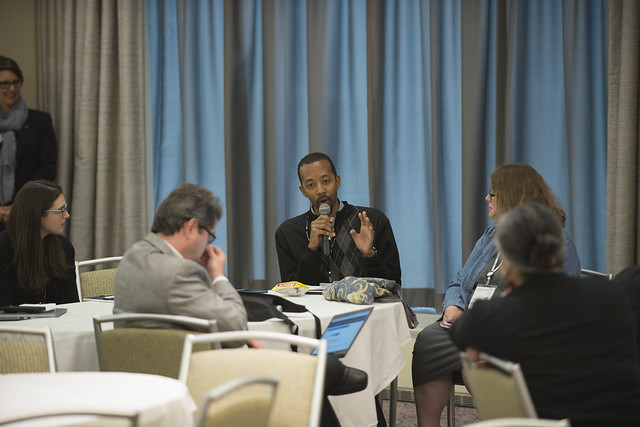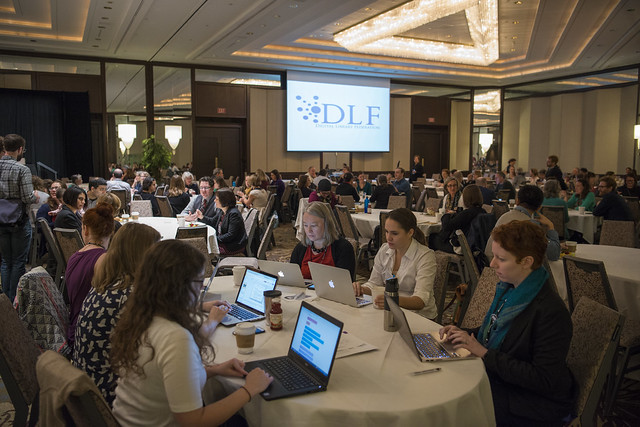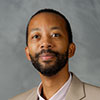This article is more than 5 years old.
At the end of October, I attended three events in Pittsburgh: the DLF Liberal Arts Colleges Pre-Conference, DLF Forum, and Digital Preservation 2017.
DLF Liberal Arts Colleges Pre-Conference
From October 22-25 I attended the DLF Liberal Arts Colleges Pre-Conference, and the DLF Forum. Leading up to these events, I was a member of the planning committee for the pre conference.
This year’s pre conference theme was “digital libraries and digital library pedagogy as common mission, common ground between liberal arts colleges & programs and HBCUs”.
One of the key goals of the pre conference planning committee was awarding travel fellowships to 24 recipients who are primarily from historically black colleges and universities or with HBCU backgrounds. Planning committee members were also scheduled to provide closing comments during the closing plenary.

The keynote speaker at the preconference was Loretta Parham, a cofounder of HBCU Library Alliance, and currently the CEO and Director of the Atlanta University Center (AUC) Robert W. Woodruff Library. Her presentation focused on important topics surrounding the future of library staffing.
One of Parham’s key talking points was about a recently published USA Today article that originally appeared on TheJobNetwork website. The piece listed what they called “8 jobs that won’t exist in 2030”. Librarian is listed as number 1 in the article. The article simply explains that librarians will no longer be needed because readers are viewing more ebooks, and using less physical books from the library.
“What does that say about conveying our worth?” Parham asked the audience.
Parham also talked about the importance of having a balance of both professional staff, support staff and students working within libraries. She noted that overall trends show that there are fewer library support staff and student staff, and more professional staff. Trends also show, she said, is a need for more professional staff with special skill sets, and recruitment of professional staff who do not have MLIS degrees.
A side note is that I met Martin Halbert at the preconference. He became the Dean of UNCG University Libraries back in July.
DLF Forum
The DLF Forum occurred the day after the pre conference. This year’s DLF was the largest ever attended at approximately 800 in attendance. There were great sessions over the two-day event, including a metadata working group hackathon, where I sat in with other attendees who explored the usability of several open source metadata assessment tools such as Hadoop and Schematron, and more familiar names like OpenRefine and Google Analytics.

This year’s keynote speaker was Rasheeda Phillips. Phillips is the managing attorney for the housing unit at Community Legal Services of Philadelphia, and Creative Director of an arts-based grassroots organization called The Afrofuturist Affair. Her presentation entitled, “Creating Communal Space-Times, Activating Quantum Time Capsules,” covered the significance of community-driven documentation, cultural memory and conceptions of time, and the potential of digital libraries to support and be shaped by marginalized communities.
Digital Preservation 2017
Digital Preservation 2017 was held October 25-26. Typically this conference is held in conjunction with the DLF Forum. I served on the planning committee for this event as well.
During the conference, I was a session chair during the Persevering to Preserve session. The three presentations held during this session focused on sustainability concerns regarding digital preservation, such as legal issues, link rot, and sustaining a digital curation workforce.
Eira Tansey was the keynote speaker. She is the digital archivist and records manager at the University of Cincinnati’s Archives and Rare Books Library. Her talk was entitled, “The Necessary Knowledge,” and focused on the critical role that environmental information plays in environmental protection. Much of her speech pulled from stories from the last century of Pittsburgh’s environmental history, including the early environmental impact of steel production.
I enjoyed my time Pittsburgh. Attending these three events proved to be a great opportunity to witness current trends in digital libraries and digital preservation, and meet great people.

4 Comments on ‘Five Days and Three Events in Pittsburgh’
Interesting idea to hire non-MLS professional staff! And the metadata working group hackathon sounds like a good time. Thanks for sharing, Mel, and congrats on successful planning committee work!
Hadoop and Schematron sound like the names of the villain of an 80’s kids cartoon series and his robotic henchman.
Nice recap, Mel! Sounds like an interesting conference.
Conference Planning x2!! Awesome. I don’t believe for a minute that we will be obsolete by 2030.
I am thrilled you were able to engage so deeply with the DLF and NDSA groups. Congrats on a successful pre-conference: I heard many great things from fellow attendees!